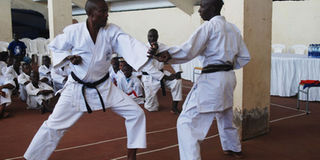Karate fights for recognition

Kenya Karate-do chief instructor Maurice Aloo Sense (right) and his technical secretary Peter Ogeto demonstrate power stance during preparations for the World Championships for the under-18 Karate National team, which was headed to Mumbai, at Nyayo National Stadium on October 12, 2013. The young participants look on. PHOTO/DENISH OCHIENG
What you need to know:
- After long hiatus, Kenya competed at the 2012 senior championships in Paris to mark revival of the sport.
- There are about 50 karate clubs in Kenya, many in schools.
Karate was introduced in Kenya almost half a century ago. Over the years, the sport has struggled to get a footing in a country more obsessed with the big sports like football, athletics and rugby than unarmed combat. But things are changing.
The introduction of Karate in Kenya is credited to Yoshio Tamura, a Japanese expatriate who arrived in the country in 1966. Tamura, who made Kenya home, still conducts training specialising in the Goju ryu style.
Despite his many years of popularising the sport, majority of Kenyans limit their association to the game through grainy videos of martial arts heroes or snippets of competition on television.
In November 2012, Kenya participated in the 21st World Seniors Karate Championship held in Paris, France. It was 32 years since Kenya’s last appeared in a competition of such magnitude. The 13-member team returned home without any silverware.
BRONZE MEDAL
A year earlier, Kenya participated in the 10th All African Games in Maputo, Mozambique, where they netted a bronze medal.
The nondescript performance has followed the familiar narrative of most sports in Kenya: meagre support, a thin fan base and player disillusionment. But according to Kenya Karate Federation chairman Caleb Atemi, the picture on the ground is gradually changing.
“Karate in Kenya has grown rapidly and extensively in the past four years,” he says. “Through the efforts of the Federation we have expanded Karate to the grassroots level. We now have the sport practised in schools, colleges and universities. Our instructors teach karate even within the disciplined forces.”
Atemi adds that while support for sport among true fans and adherents has never waned, support from the government has been lean while corporate organization have not exactly been lining up to dish out endorsements.
GLACIAL PROGESS
He points out to the Paris championships preparations, where the team wasn’t sure of participating until the last week to the tournament.
“Karate is still regarded as “the other sport” by the government,” laments Atemi. “This makes it very difficult for us to plan and manage our calendar since the Ministry of Sports remains our biggest sponsor. Most times we have to rush at the 11th hour to get our players visas.”
Additionally, lack of mainstream acceptance and recognition has contributed to the glacial progress of the sport.
Negative myths abound concerning the sport; with some linking it to the occult and violence.
“Karate’s main endeavour is to promote discipline, peace and respect for law and order,” says Gibson Mutuku, one of the most experienced karate exponents in the country who has been a student and trainer of the sport since 1984.
Failure to streamline operations within competing associations has maimed the sport. This has been evident during championships when hastily cobbled associations present budgets for funding.
PUBLIC GOODWILL
Ultimately, public goodwill and support will play a role in how far the sport will grow in the country and KKF is building on that.
In 2012, Fisheries Development Minister Amason Kingi announced that he would take up karate lessons following an attack by machete wielding youths in Kilifi in 2012, a subtle endorsement, but one nonetheless.
Then in June 2013 news story on television showed how a group of elderly women in Kisii had taken up karate for self defence against rapists.
There are more than 20 registered Karate clubs in the country and 30 unregistered clubs, most of them in schools.
“We need to increase, expand and internalize our marketing and presence in all the 47 counties. The government should enlist karate in schools as an official sport,” says Atemi.
This will assure the sport of sponsorship and make it part of the curriculum.”




